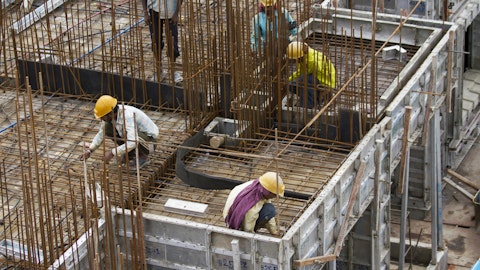Christopher Moore: Yes, maybe we could start with Prospera. So obviously, Investor Day was discussed in very positive terms. Already seen some signs of softness in North America Ag. Just trying to understand kind of what has changed between now and then and perhaps as part of that question is the time frame on the Prospera analysis. Is it — was it more heavily weighted when you’re doing the calculations to figure out the goodwill impairment?
Avner Applbaum: Yes. Let me start off with the — just some background and overview on Prospera. Tim can then address kind of the timing of the impairment. But I’d like to go back just several years where we actually started a partnership with Prospera in 2019. And really, the vision was to transform the center pivot to — from an irrigation machine to an autonomous crop management. So we can really enhance crop precision, we could save the growers’ time, reduce costs, optimize land usage and, of course, increased yields. Fast forward 2021, there was a decision to expand the strategy. They will were venturing beyond traditional pivot acres and really pursuing recurring revenue from a subscription-based agronomy tech solutions.
And as we mentioned, that strategy really didn’t pan out as planned. We’re going back to the original view of how can we provide autonomous crop management. How could we use all the technology suite that we offer to our growers anywhere from remote monitor control, irrigation optimization and, of course, the agronomic insight. Now we’re very pleased with the technology around the agronomy, the AI and the machine learning. And as I mentioned, I was just meeting some dealers and some of our agronomy partners are extremely excited about this technology to really help them solve some of their biggest problems. Our dealers are excited, our growers are excited. But really, we’re going to focus on the core. The core of our business is how do we help solve the growers most immediate needs and do more with less and improve their yields, et cetera.
So we continue to manage our entire tech suite. And we are leaders in that space, we have revenue of overall take up greater than $100 million, and we will continue to build on that and expand while we keep on focusing on the growers and solving their solutions.
Timothy Francis: And I’ll jump in and answer your question, I think it was specific on the timing. So I draw one attention to you. If you go back and look at corn futures in the United States in mid-May, they were still strong. compared to the pricing that you can see today of, let’s say, $4 or $4.90. So at the time of Investor Day, there really wasn’t this indication yet of a downward — more downward North America ag market and what we have seen this happened today. As you look at goodwill and certain intangible assets, you’re required to test them annually. Our annual testing date is the end of August. So qualitatively, we really didn’t have a reason to do a test between our annual impairment tests, so of course, we would have done a test third quarter of last year. We had to do a test third quarter of this year. There was nothing qualitatively that told us we needed to do a test in that interim period between our 2 annual testing dates.
Christopher Moore: Got it. And maybe just one follow-up for me. So it sounds like from what Avner said, the recurring kind of strategy had not been working to the extent that you were hoping it was. Is the decision here — is that at all kind of part and parcel of the new strategy or this would have happened regardless? This is not a kind of a management decision to have a little less focus on the Prospera side?
Avner Applbaum: Absolutely not. We’re very much focused. We do believe it has a value proposition. I’ll just point out, of course, we like, like every other company, we like recurring revenue, it’s recurring. It has strong margins, and we’ll keep on benefiting from that. We’re not necessarily going to go after recurring revenue. If that is if we’re solving a problem for our customer and the outcome of that is that we can provide recurring revenue, that is a great outcome. But we’re not going to go, like I said, specifically outside our core to try and drive recurring revenue.
Operator: Our next question is from Brent Thielman with D.A. Davidson.
Brent Thielman: Avner, the realignment and sort of new initiatives that you’re putting in place. Do you expect these to be largely complete prior to year-end such that the business and the cost structure sort of positioned how you want it to be as we go into 2024? Is this going to be an effort that bills well into next year?
Avner Applbaum: Yes. Thanks for the question. So overall, we took this realignment, and I will mention that we never take it likely when this is involved employees, but it’s really what we need to do for this organization in order to drive us forward. And it really helps us as we continue to drive our strategy really helps us to be more focused, that helps us to streamline processes, make stronger, quicker decision by kind of reducing some of the management layers, we get better visibility into the business. And these actions, I believe, will really drive significant value going forward. And to answer specifically your question, yes, we should be pretty much done with the alignment by the end of the year. A lot of the actions we’ve already taken place. We put the management team in place and we’re ready to move forward with this realigned organization.
Brent Thielman: Okay. Appreciate that. And then can you just remind us that the project-based business visibility that you have to execute, I guess, in the fourth quarter and maybe into ’24, I guess I’m speaking specifically Egypt. Any help in terms of what the contribution could be over the next several quarters? And has the conversion of that pipeline of business changed at all in terms of converting sort of opportunities out there and actual orders? Or are there still some good prospects to add to that backlog near term?
Avner Applbaum: Yes. Okay. So overall, this large Egypt project that we won, which really provides Egypt with a lot of their food security, which today we kind of — they refer to that as their national security, is part of our approach to that region where we could really help these country drive food security. Specifically, this project is going into 2024, and we’ll continue and projects can always move right now in anticipation is — would go into the rest of 2024. And of course, we are watching very closely the conflict in the Middle East and evaluating if that has any impact on us going forward, but we continue to be excited about the region. We believe we have a very strong value proposition there with our — have the strong presence we have in that area in Dubai.



